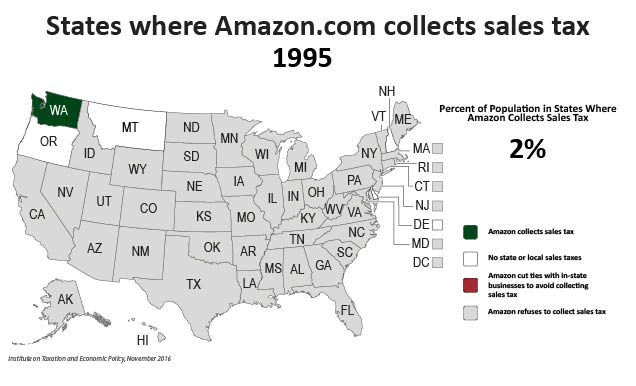Amazon is fully ditching what was once considered its biggest advantage: not charging state sales tax. On Saturday, Amazon will begin collecting the tax on purchases made in Hawaii, Idaho, Maine and New Mexico, meaning it will now collect sales taxes in every state that levies one. (Alaska, Delaware, Montana, New Hampshire and Oregon don’t impose a state sales tax.)
For years, Amazon fought to be able to provide tax-free shopping to its customers, even as traditional brick-and-mortar retailers complained that tax laws for online retailers created an uneven playing field. Many states’ laws said that e-commerce companies only had to collect sales taxes in states in which they had a physical presence.
Related: The Best and Worst States for Sales Taxes
As recently as 2011, Amazon was collecting sales tax in just five states, home to 11 percent of the country’s population, according to Carl Davis of the Institute on Taxation and Economic Policy. But a few years ago, as Amazon began to pursue a strategy of expanding its network of distribution and data centers to improve its delivery times, it gave up the fight. State officials — like those in Colorado — have also been crafting creative laws to encourage online retailers to collect the sales tax.

By last year, Amazon was collecting sales tax from customers in 29 states, home to 86 percent of the U.S. population. Even so, the company still does not require that many third-party sellers that use its platform collect sales taxes. The company says that last year more than 100,000 sellers generated more than $100,000 each in sales, meaning that those merchants totaled more than $10 billion in Amazon revenue.
Some states are working to crack down on such tax-free third-party sales. New York Gov. Andrew Cuomo, for example, has proposed requiring “marketplaces” with more than $100 million in annual sales — Amazon and eBay — to collect taxes on sales made by third-parties.
The National Conference of State Legislatures says uncollected taxes on e-commerce sales cost states $17.2 billion in 2015.





